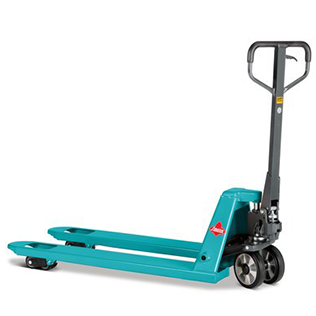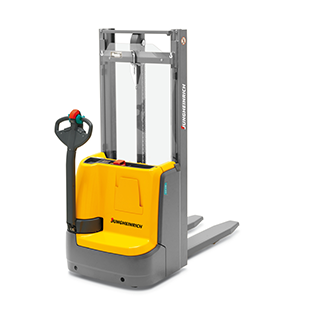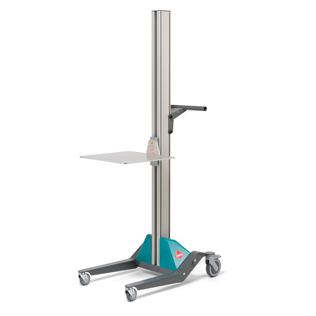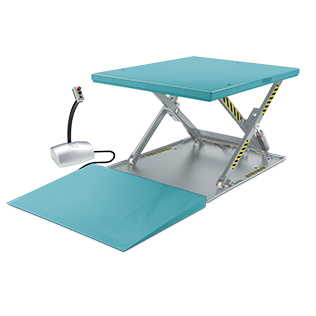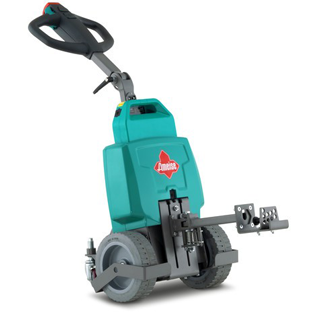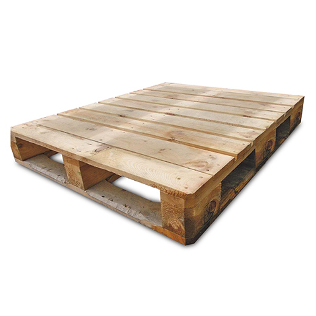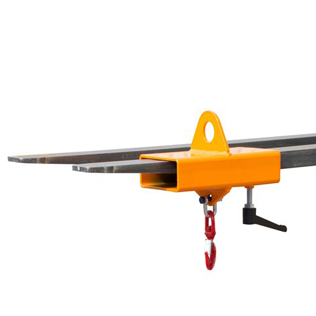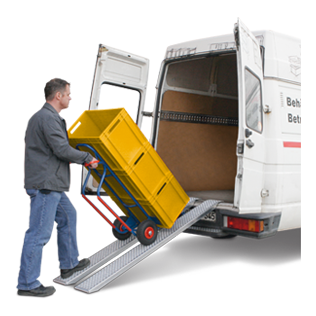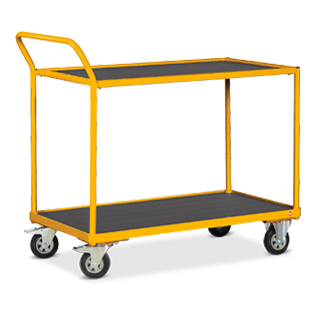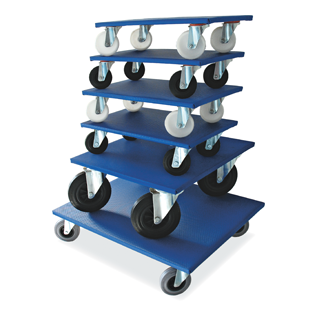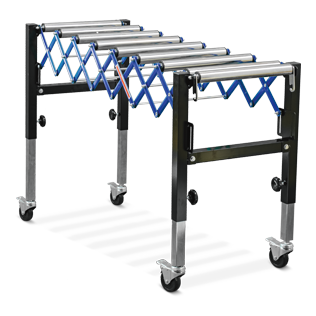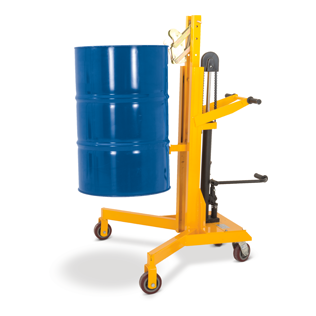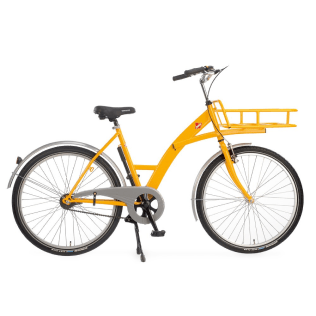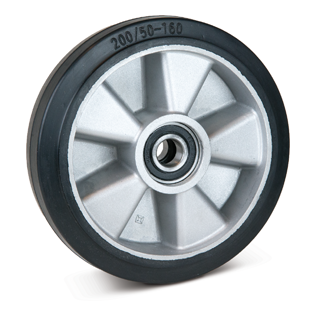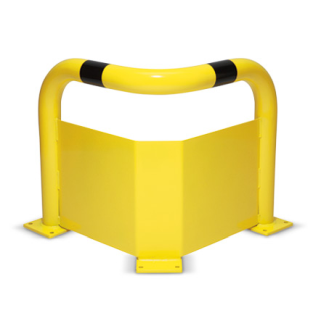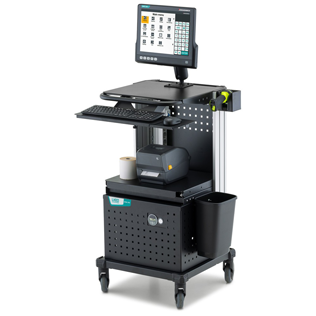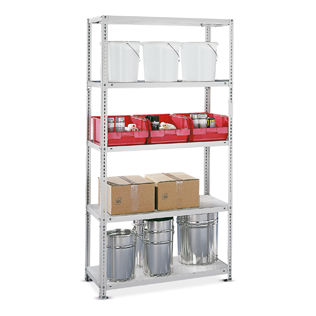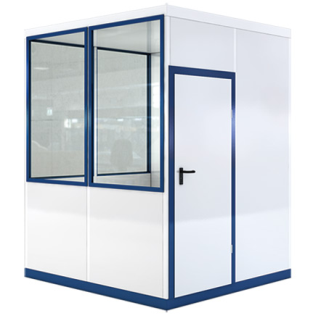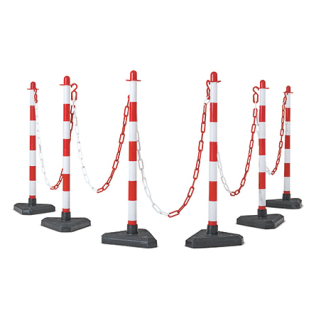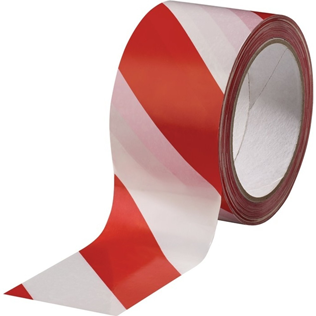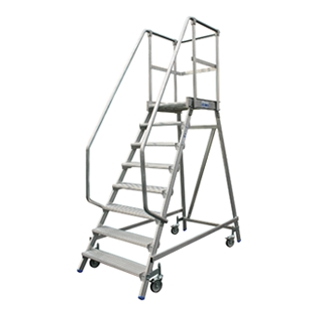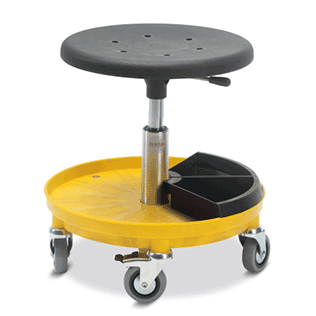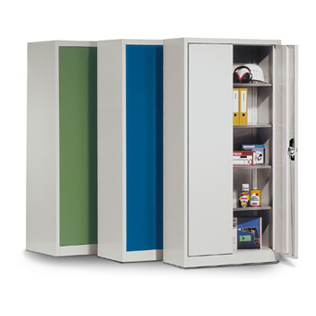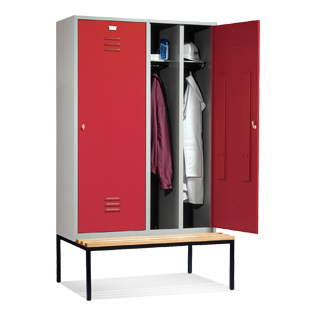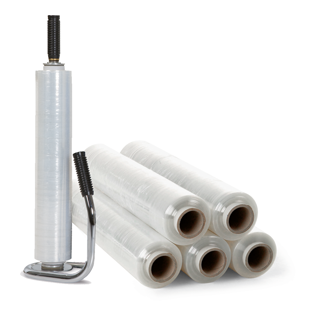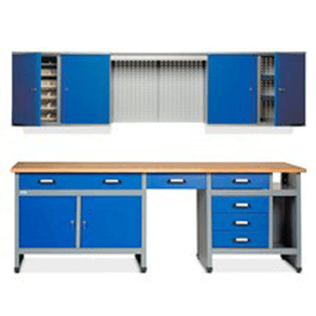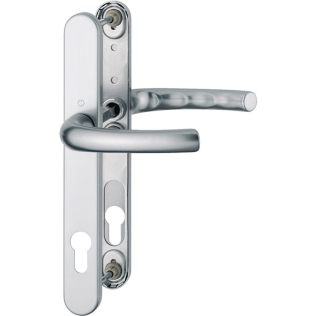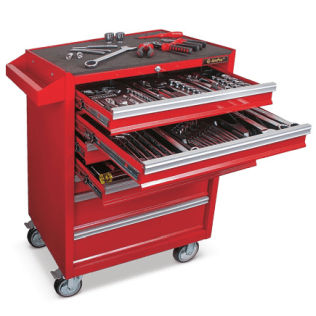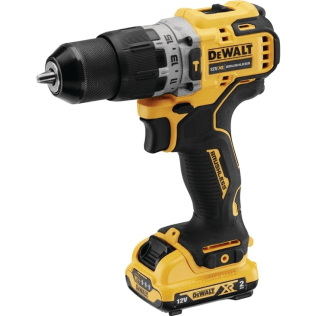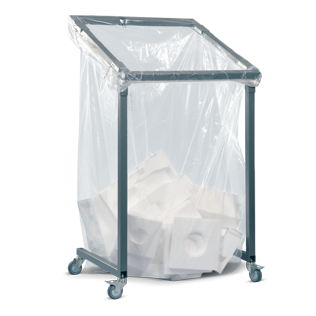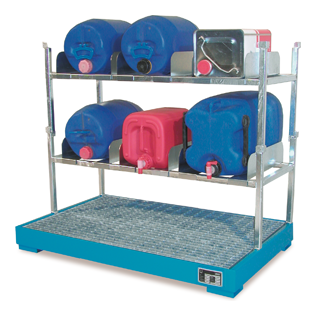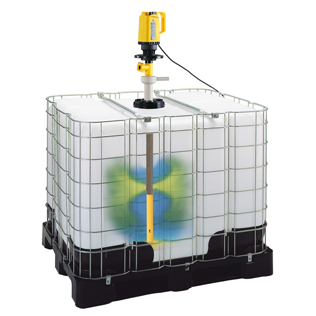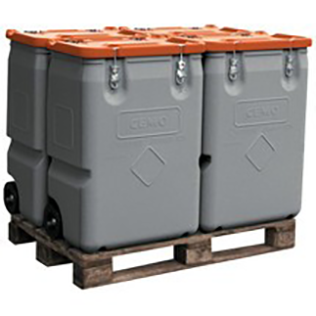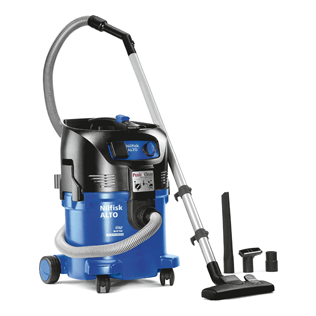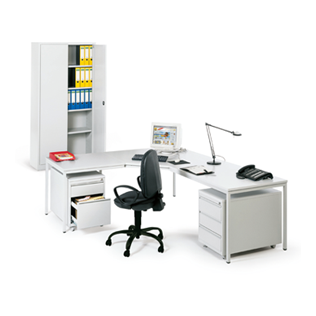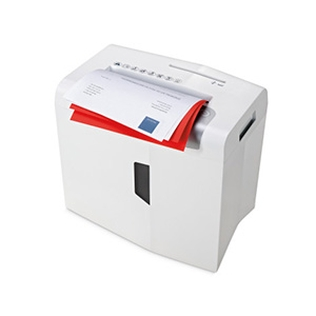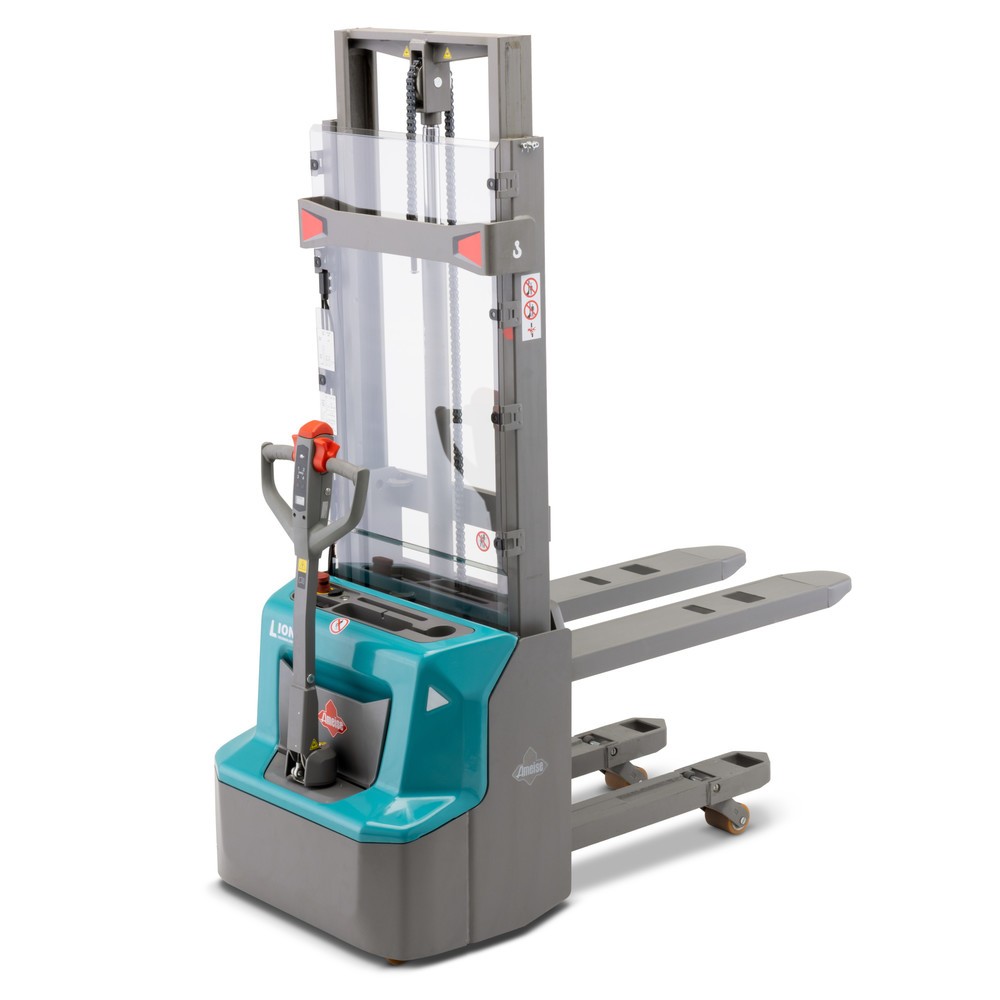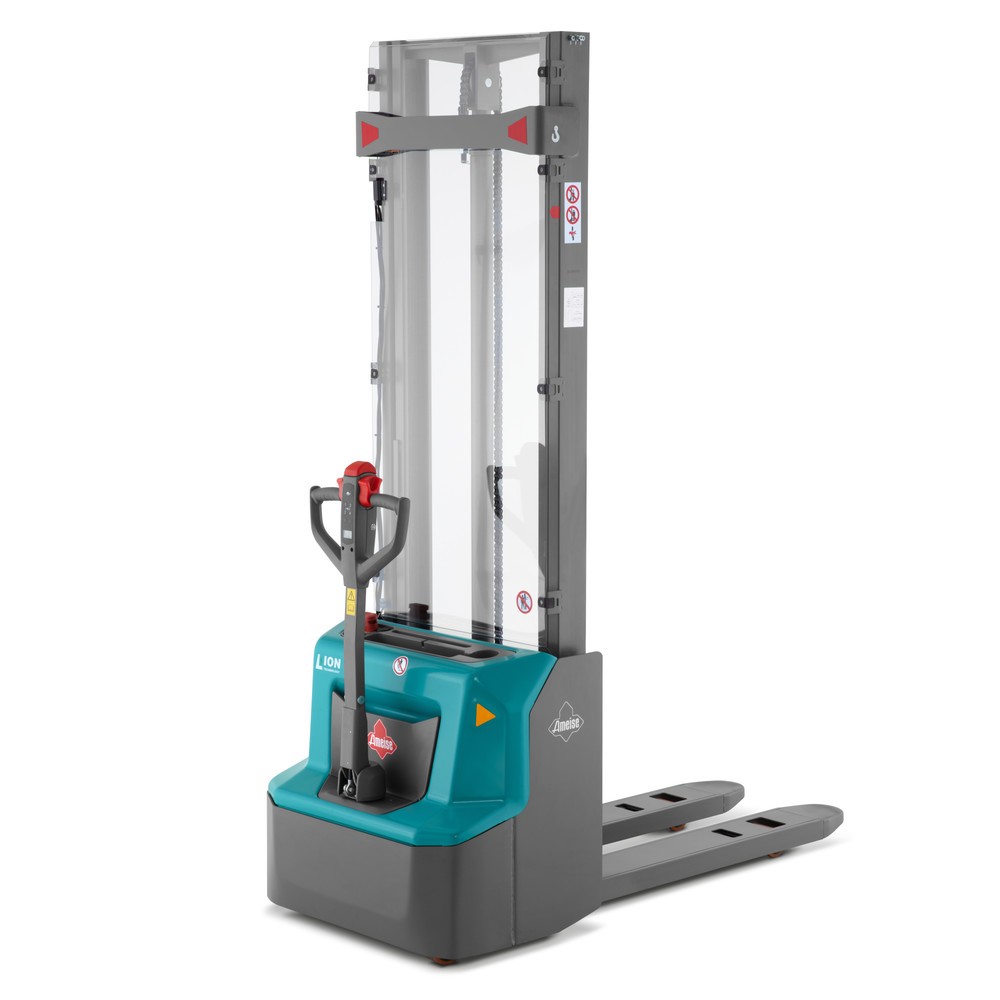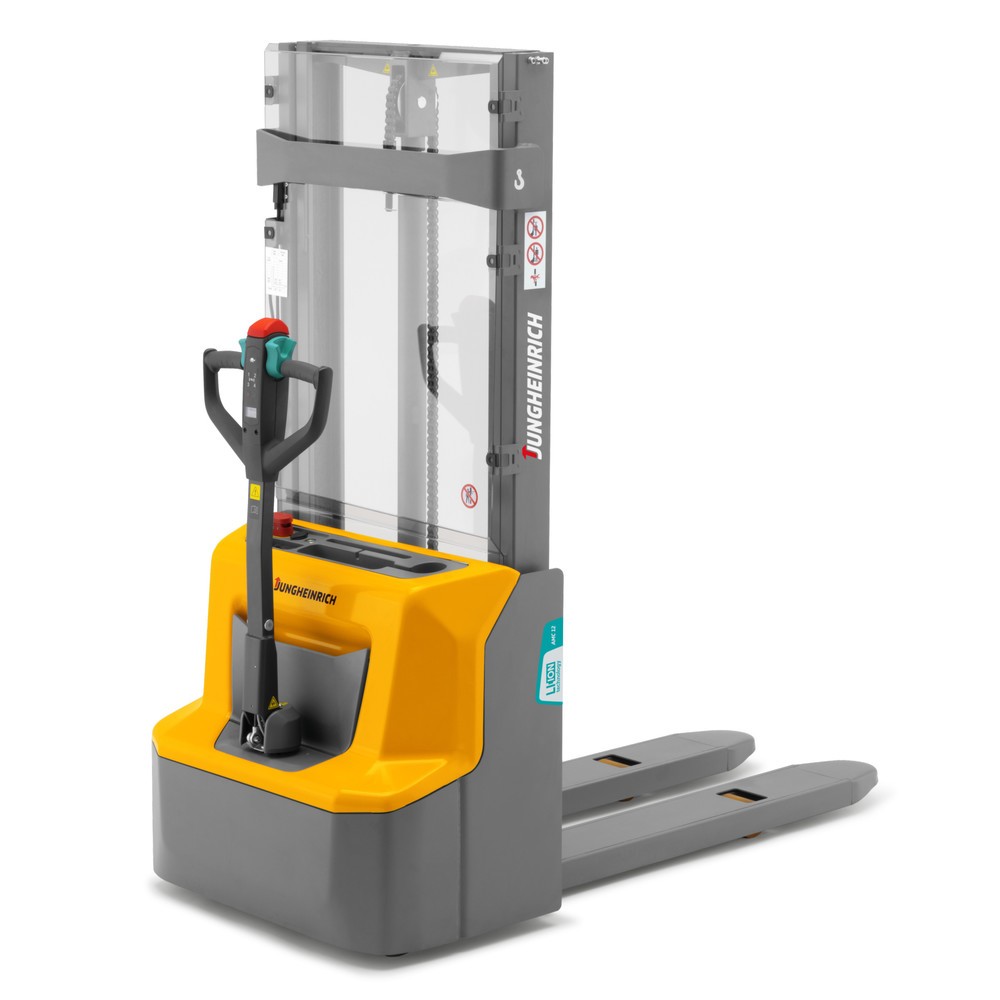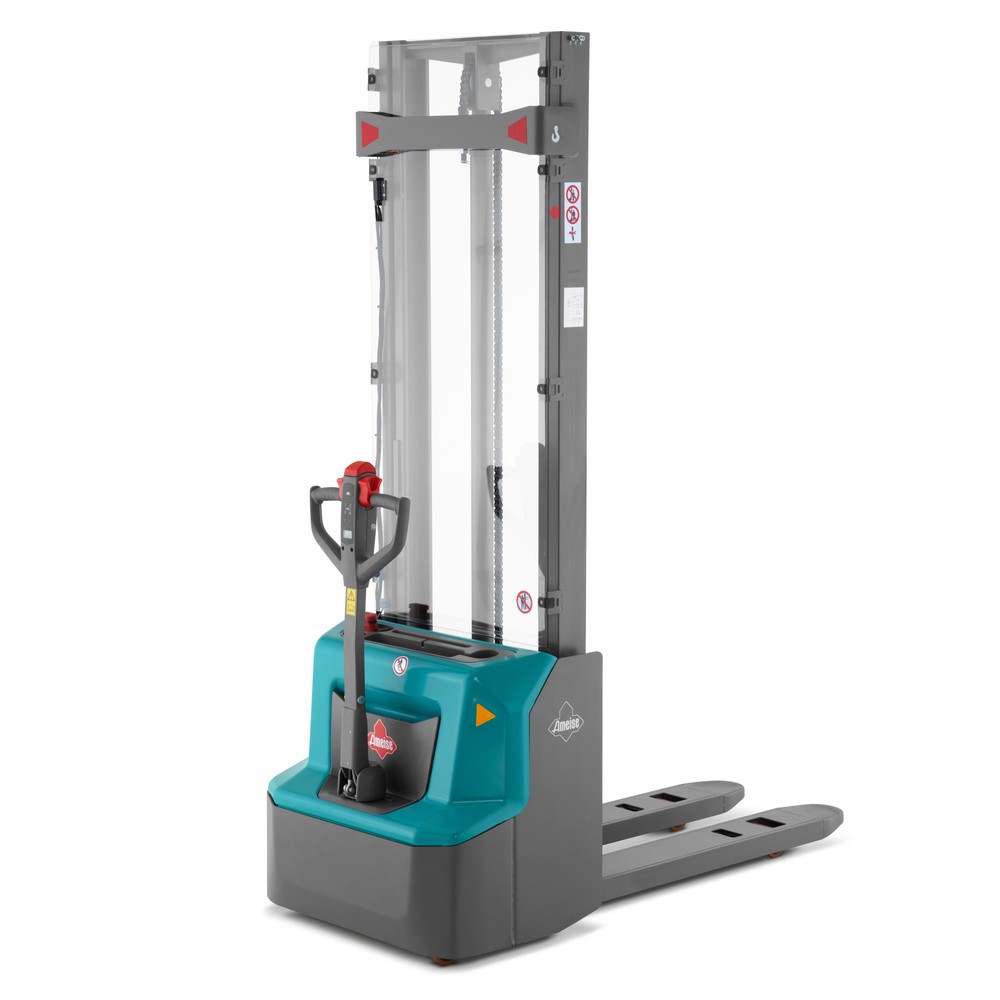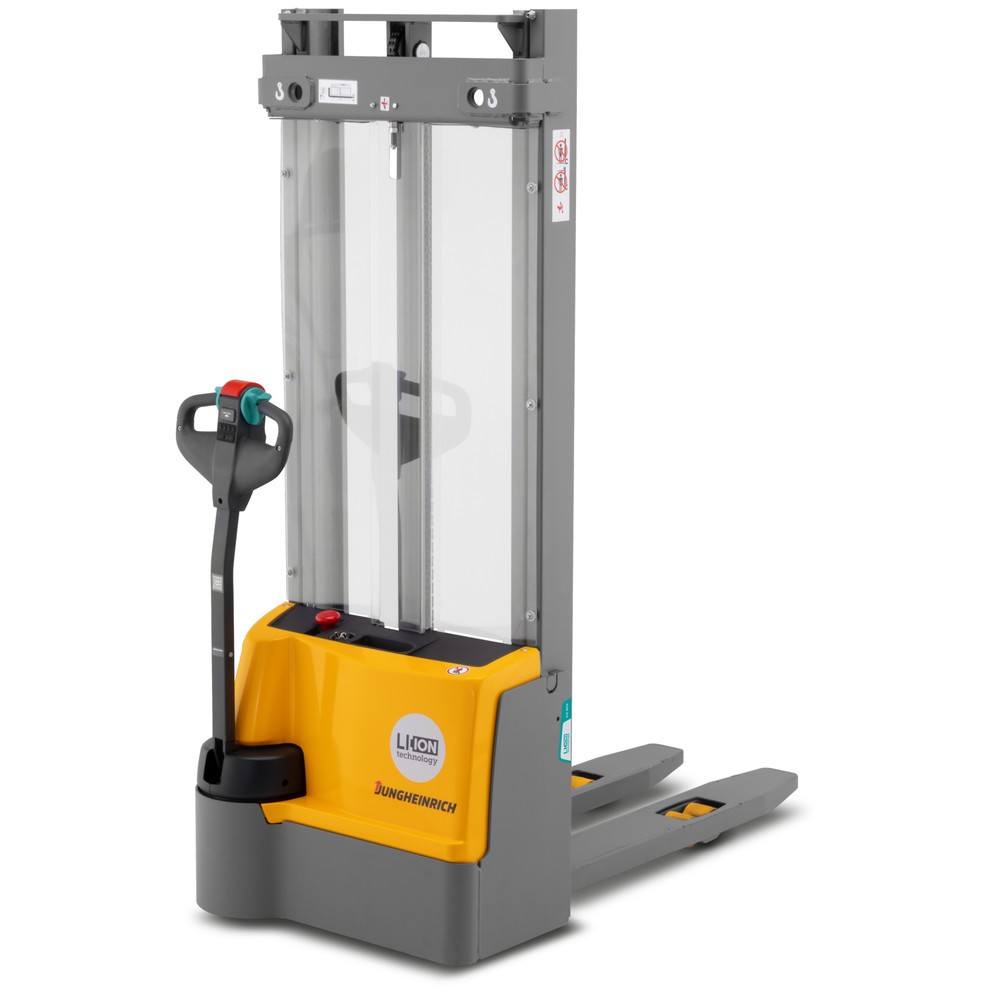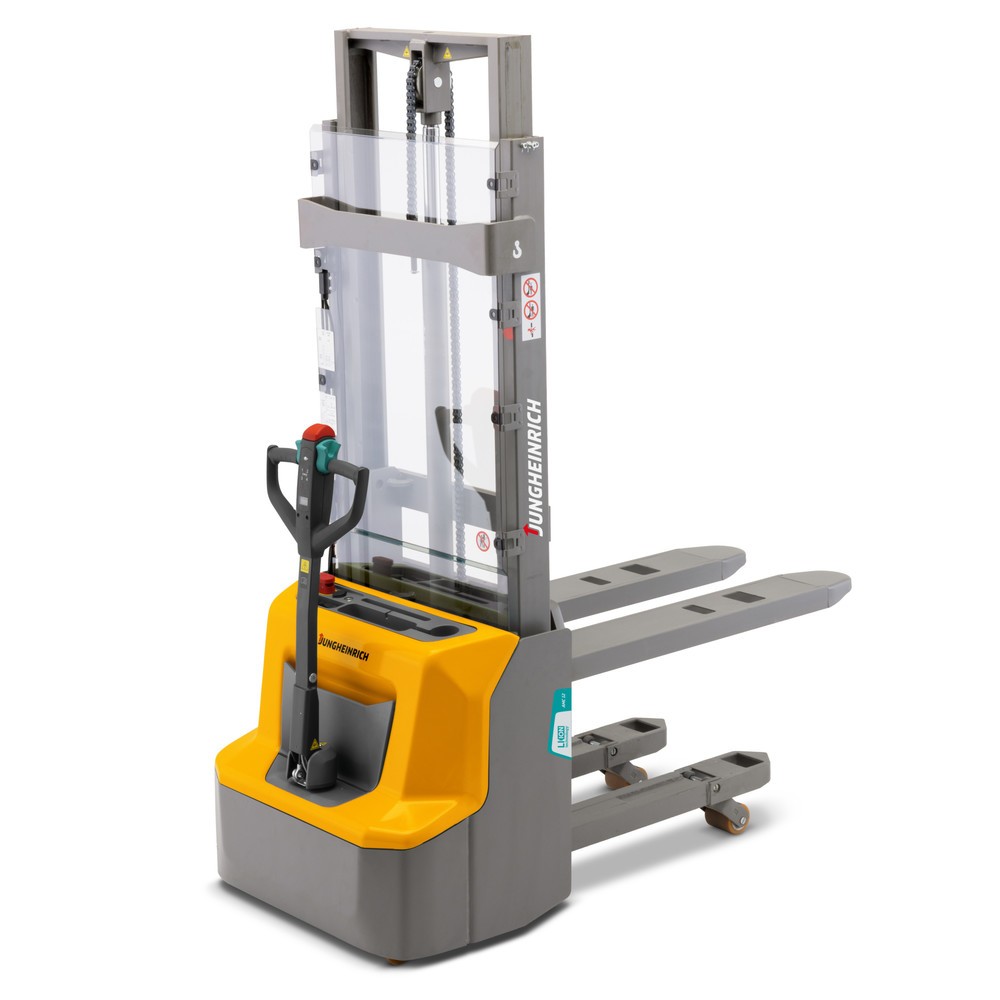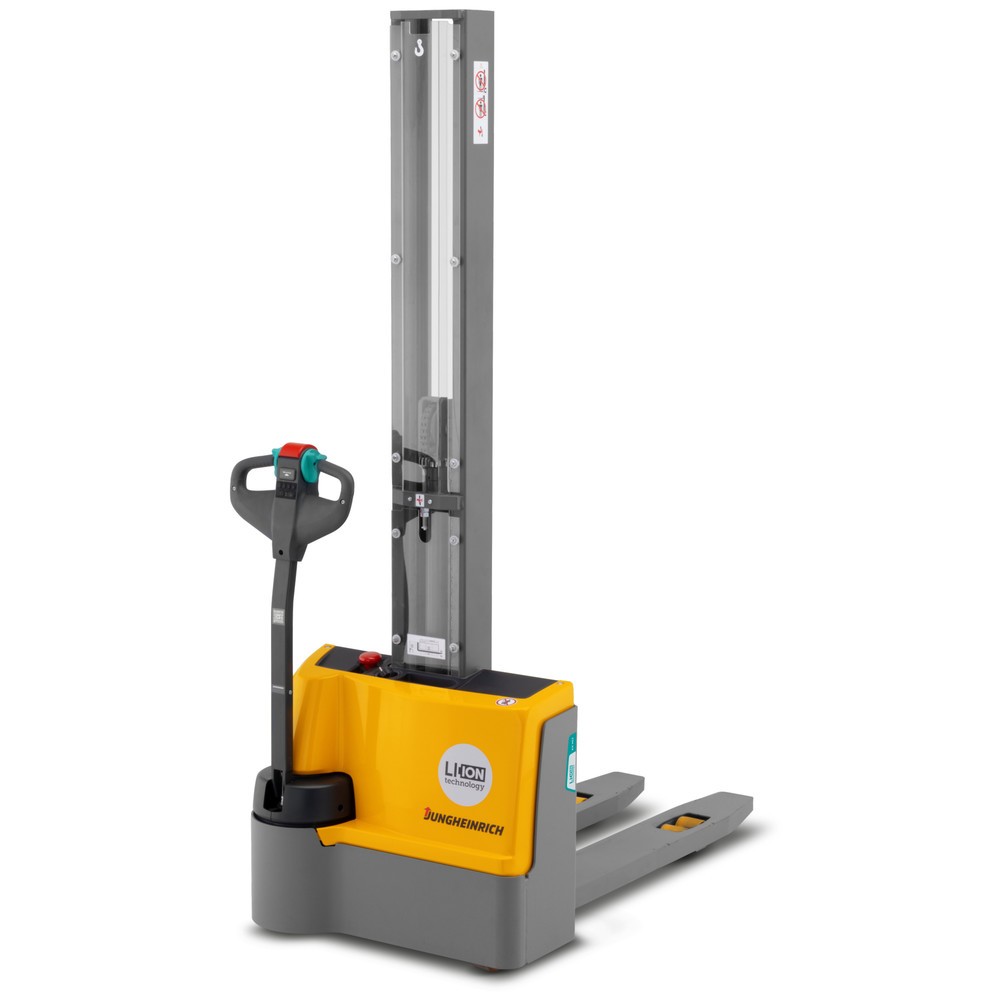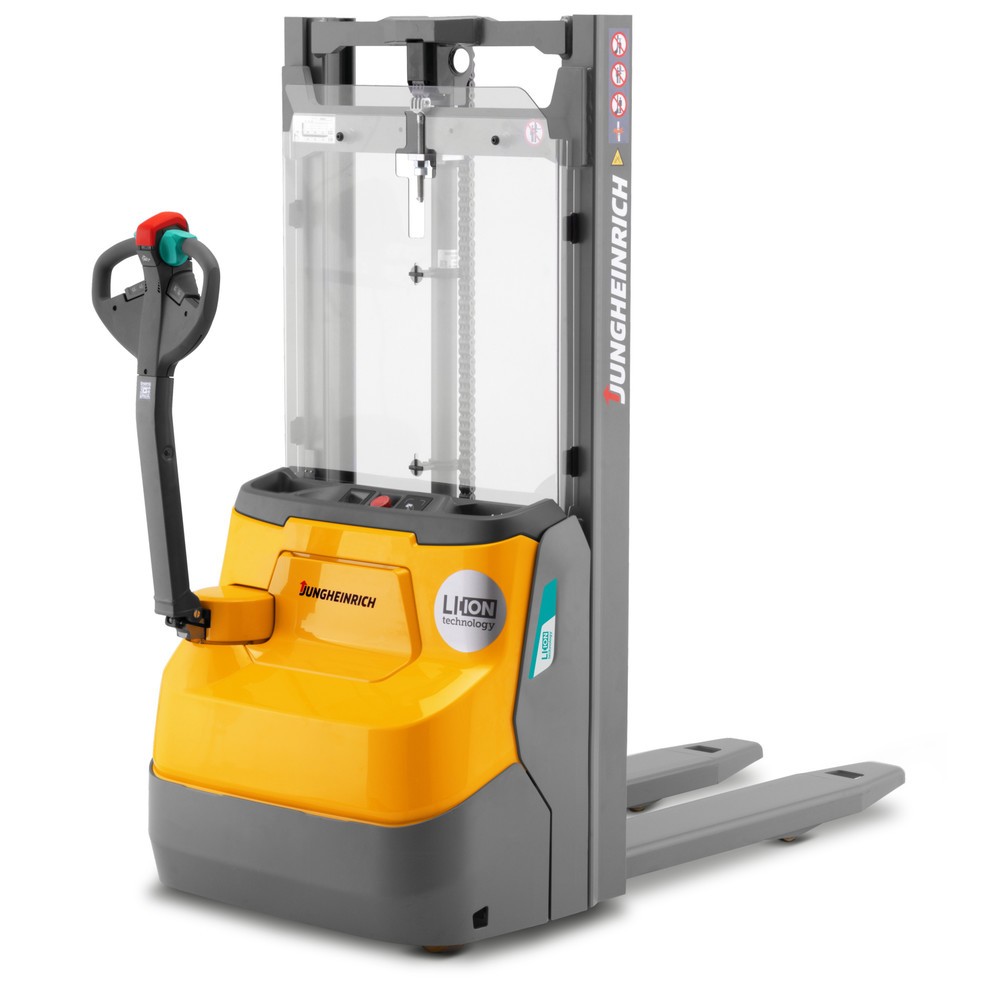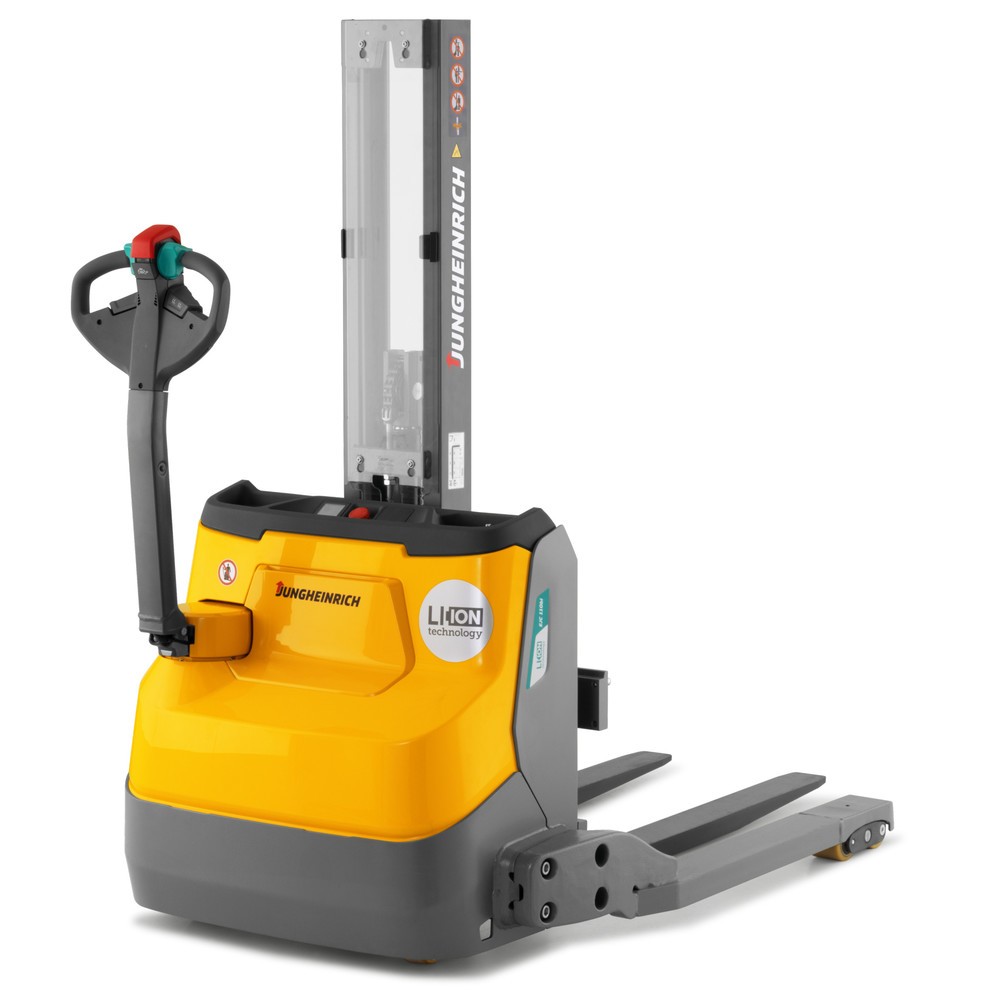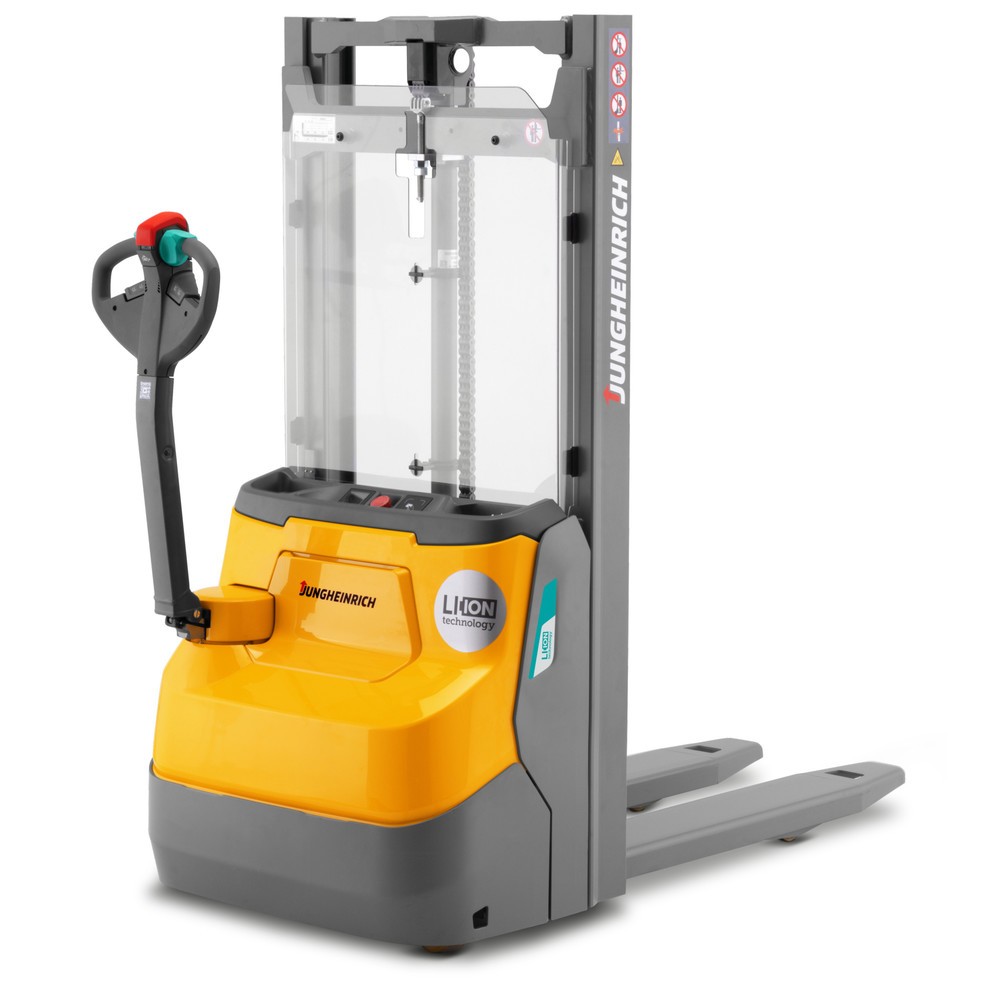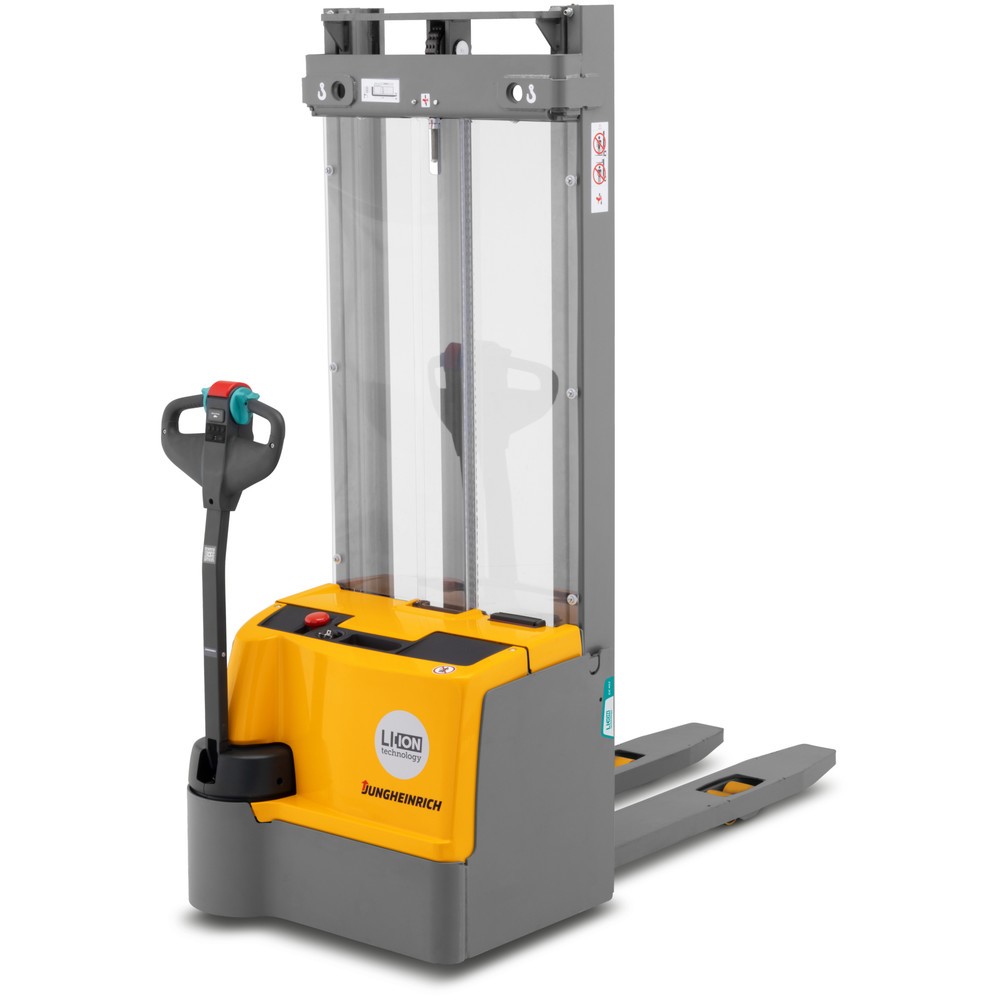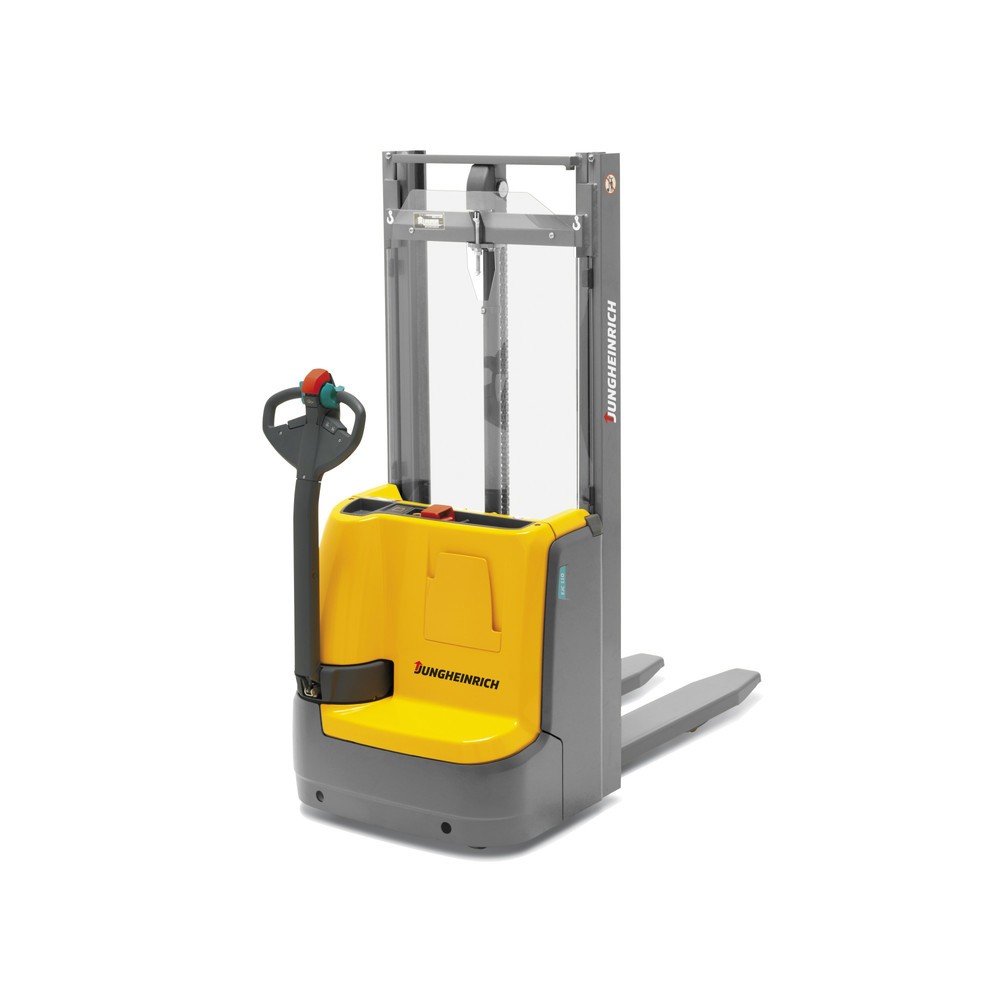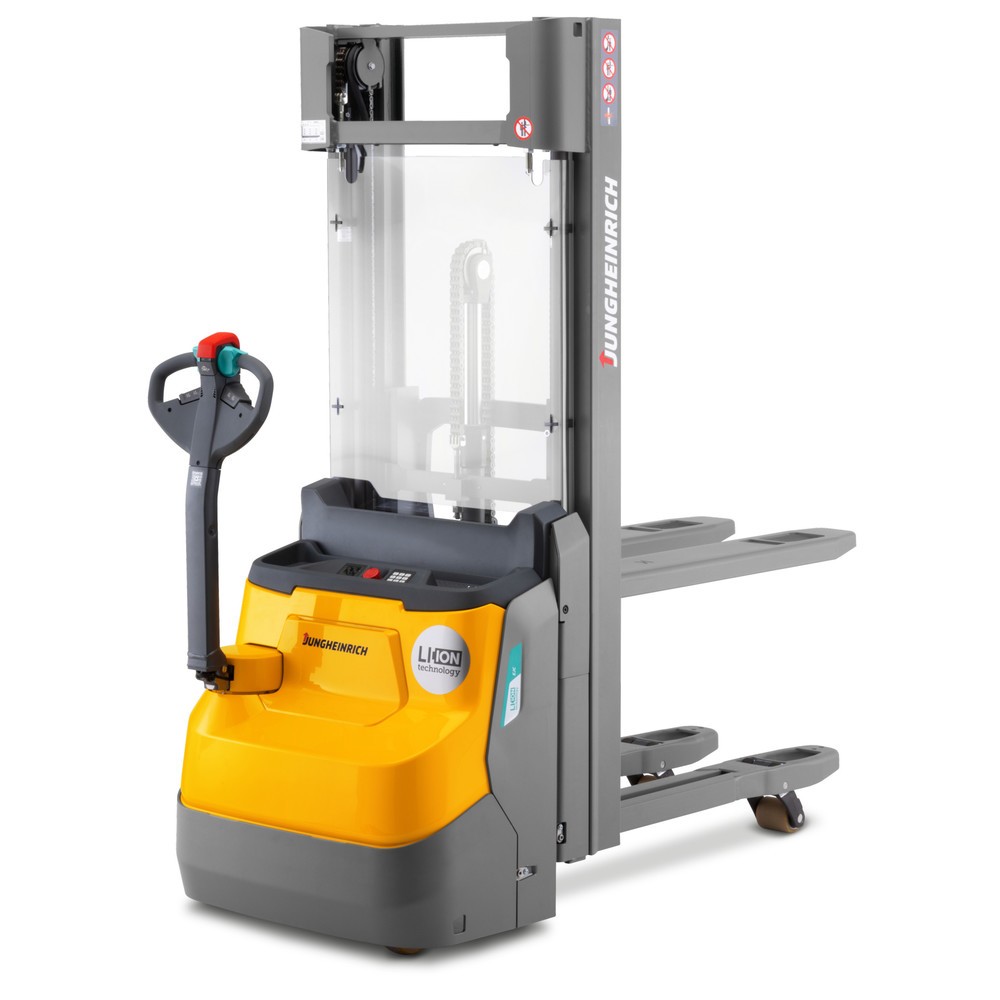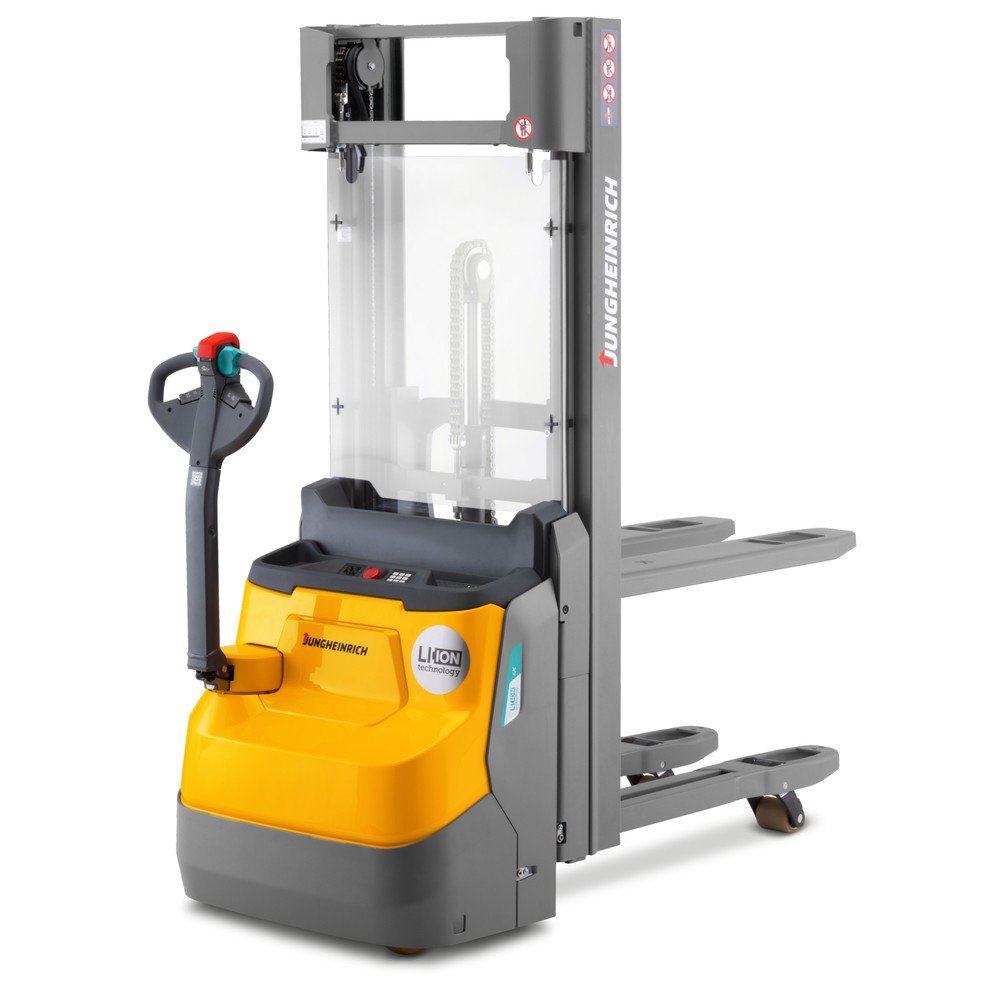Electric Pallet Stackers for Convenient Load Transport
With high-lift electric pallet stackers, you can not only move pallets quickly and safely from A to B, but also transport them to great heights. Discover the different types of electric stacker truck and what you need to look out for when choosing a suitable model for your business in our buying guide.
1. What is an electric pallet stacker?
Thanks to the mast, electric high-lift trucks - in contrast to low-lift trucks - not only enable goods to be transported at ground level, but also allow grid boxes, pallets and other goods to be transported vertically when stacking and retrieving them in racking warehouses. This allows you to handle loads ergonomically and safely. And all this without the use of muscle power, because with electric pallet stackers, the lifting process is powered.
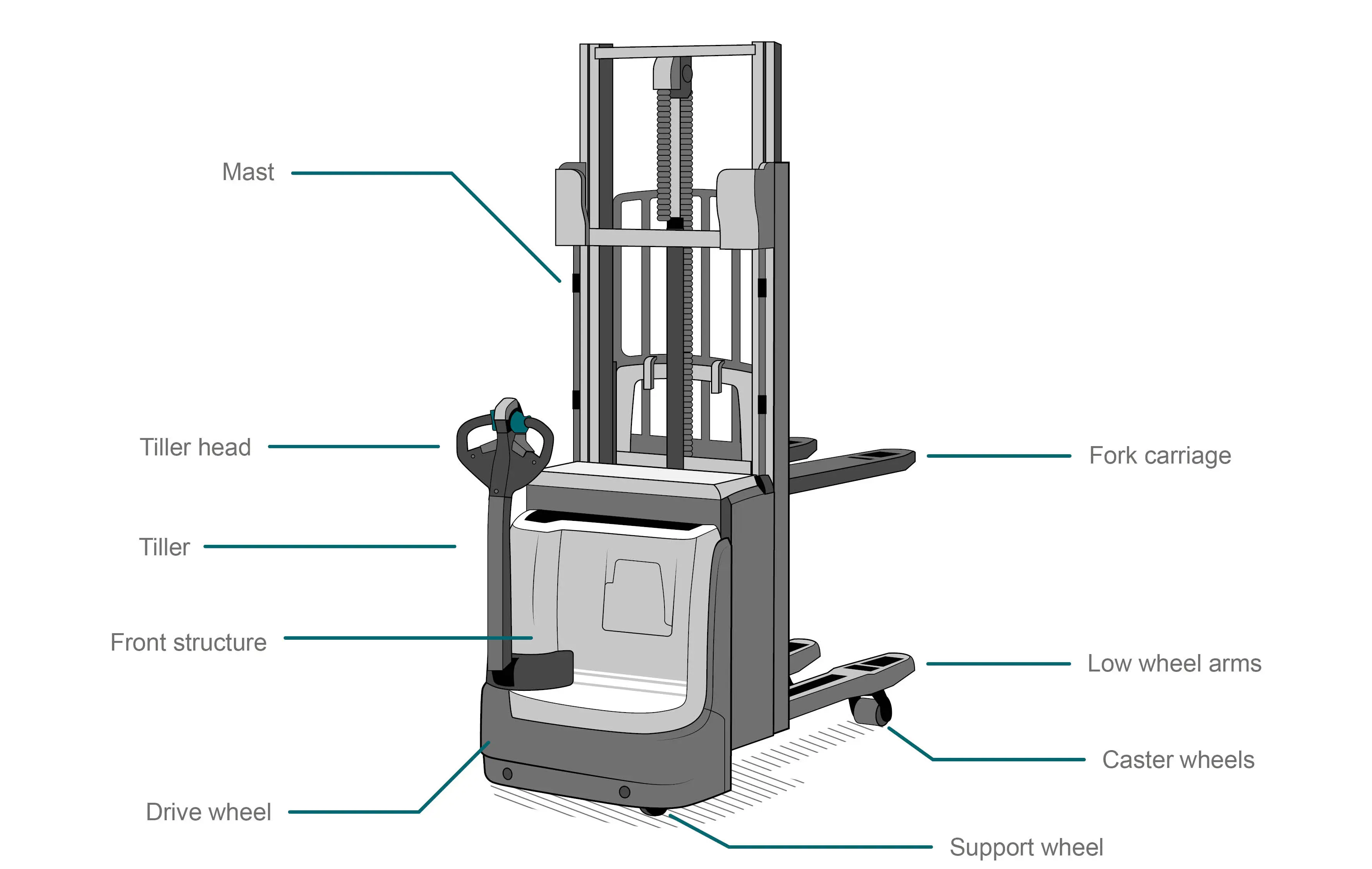
Electric pallet stackers are also known as: high lift pallet trucks, electric stacker trucks, powered pallet stackers, pedestrian stackers, electric high-lift trucks, power stackers, electric forklifts.
2. How to find the right powered pallet stacker
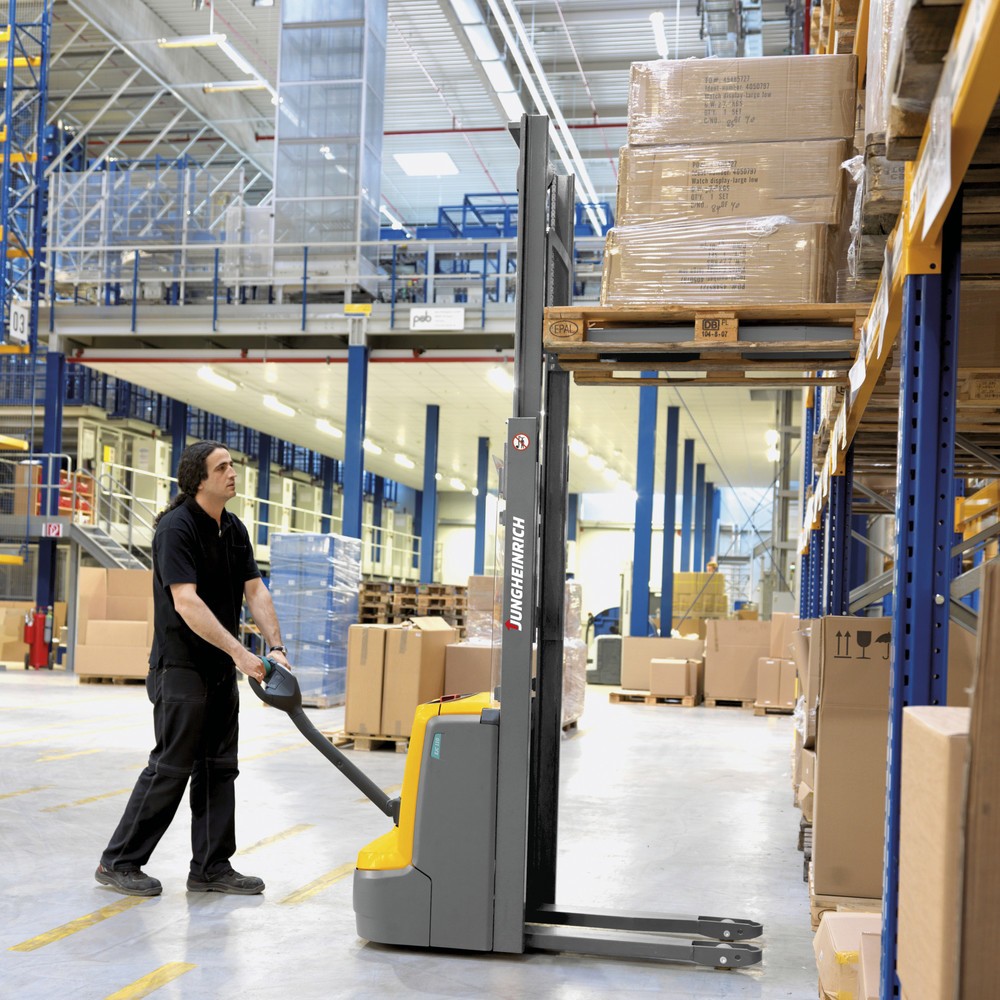
Before buying a new powered pallet stacker, it can be helpful to draw up a detailed requirements profile. Mapping a use case plays a central role in this process, because the selection of industrial trucks is largely determined by the characteristics of the given work environment. The following questions will help you define the selection criteria:
- How many hours will my power stacker be used per day?
- What driving distances do I need to cover?
- At what heights should my goods be stored?
- What are the ceiling heights of my premises?
- Will my power stacker be used to load/unload trucks?
- Are fragile goods to be transported?
- Are my routes free of barriers such as inclines or ramps?
All relevant parameters for the forklift selection are explained in detail below to help you answer these questions.
Intended working environment for the electric pallet stacker
An important criterion for selecting the right electric pallet stacker is the intended working environment for which the industrial truck is required in your company. This includes, for example, whether the truck is to be used indoors or outdoors, whether you need it for stacking and unstacking goods under extreme temperature conditions, such as in deep-freeze warehouses, or whether the electric stacker must be suitable for loading and unloading trucks.
| Application criteria | Suitable electric high-lift power stacker |
|---|---|
|
Indoor and/or outdoor use
|
|
|
Use with trucks
|
|
|
Ceiling height or lowest clearance height
|
|
|
Length of transport routes
|
|
|
Gradients
|
|
For use in clean rooms and hygiene-sensitive areas, as well as in corrosive environments, we can also provide you with stainless steel electric high-lift powered stackers on request. To stack and unstack goods in very cold or humid environments, e.g. in (deep) cold stores or greenhouses, we also offer electric stackers with optional cold store equipment.
Drive Type
We offer electric pallet stackers with two different types of drive:
- Fully electric high-lift power stackers with two motors are a particularly convenient solution for storage and transport tasks. Here, the drive motor takes control of the forward and reverse movement to the desired storage location. Once at the destination, the lift motor raises or lowers the fork carriage together with the loads. The operator conveniently controls these functions via the controls on the tiller head.
- Semi-electric high-lift trucks, on the other hand, have only one motor. In this type of high-lift truck, only the lifting work is performed by the electric lift motor; the movement is performed manually by means of the tiller. In addition, ergonomically arranged guide handles facilitate pushing and manoeuvring during stacking and retrieval.
Before purchasing an electric forklift, you should therefore analyse your company's needs in detail: If only infrequent or occasional stacking tasks occur in the internal transport of goods, a semi-electric stacker can be a cost-effective solution. For greater lifting heights, all-electric electric forklifts are the more suitable option, especially for regular use.
Lifting height
The lifting mast, also known as the lift mast, moves the load carrier and the load vertically. The dimensions of the mast are essential criteria to compare the characteristics of different masts. Depending on how high your storage racks are or at which height loads must be stored and retrieved in your company, an electric stacker truck with the appropriate lifting height and other lifting parameters should be selected. The following terms are of particular importance:
| Term | Meaning |
|---|---|
| Lift mast, overall height |
The overall height is the maximum height of an industrial truck, measured from the ground. However, in the case of industrial trucks with high-lift equipment, it can change - depending on the mast and depending on whether the mast is retracted or extended. |
| Maximum lifting height |
This term refers to the greatest possible distance from the ground to the highest position of the load handling attachment (top edge of the fork or platform) in the lifted state. |
| Free lift |
This refers to the lifting height up to which the load handling attachment can move upwards without changing the overall height of the mast. The free lift function is ideal when stacking is required at low ceiling heights, e.g. in containers, enclosed rail freight cars or basements |
Mast types
At Jungheinrich PROFISHOP you will find electric pallet stacker trucks with four different mast types:
- Simplex mast = single lift mast
- Monomast = single column single mast
- Duplex mast = two-section telescopic mast (available with and without additional lift (free lift))
- Triplex mast = three-part telescopic mast with additional stroke (free stroke)
The principle of operation is the same for all models: the lift carriage, with the fork carriage and the load, is moved vertically within the standing mast or lift mast by a lift motor. On some models, the mast can be extended telescopically two or even three times. In this way, much higher storage spaces can be reached without restricting mobility in low working areas. In our video, the principle is explained using the example of an electric high-lift power stacker with duplex mast:
| Mast type | Construction | Advantages | Disadavantages |
|---|---|---|---|
Simplex 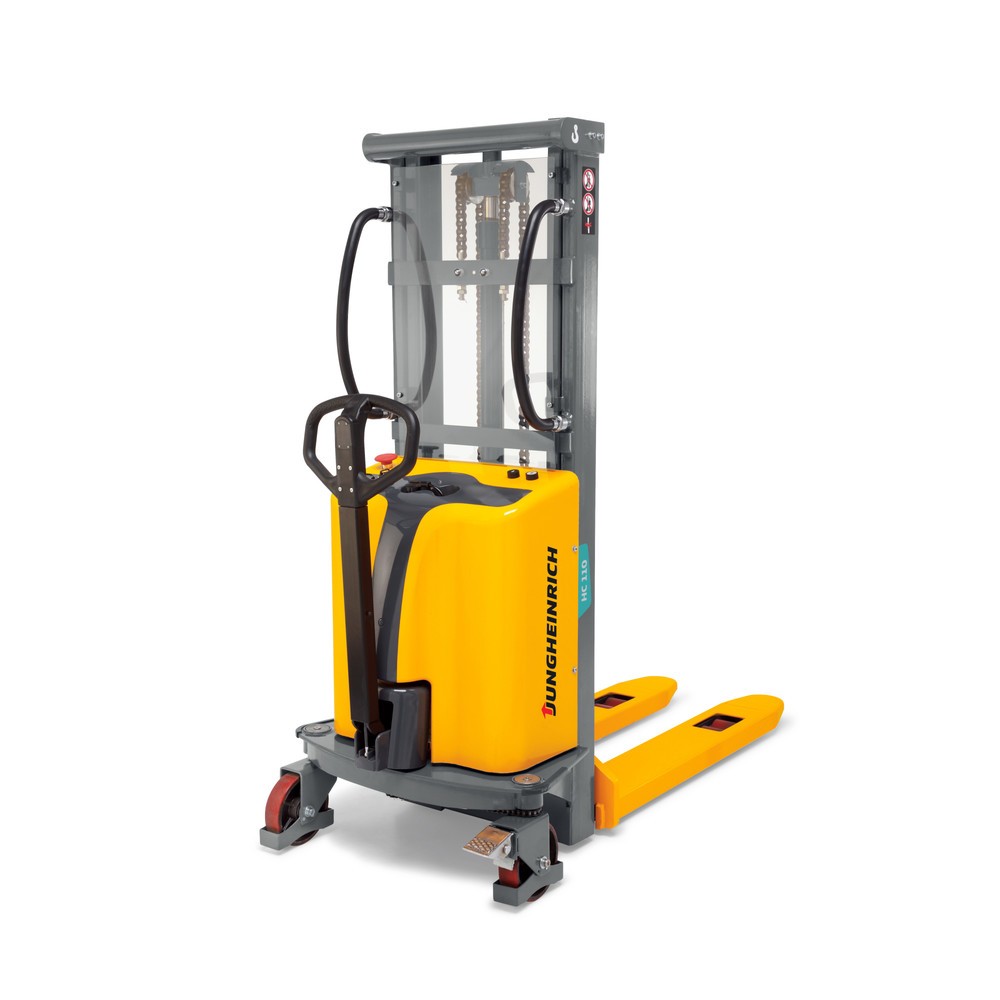
|
|
|
|
Mono 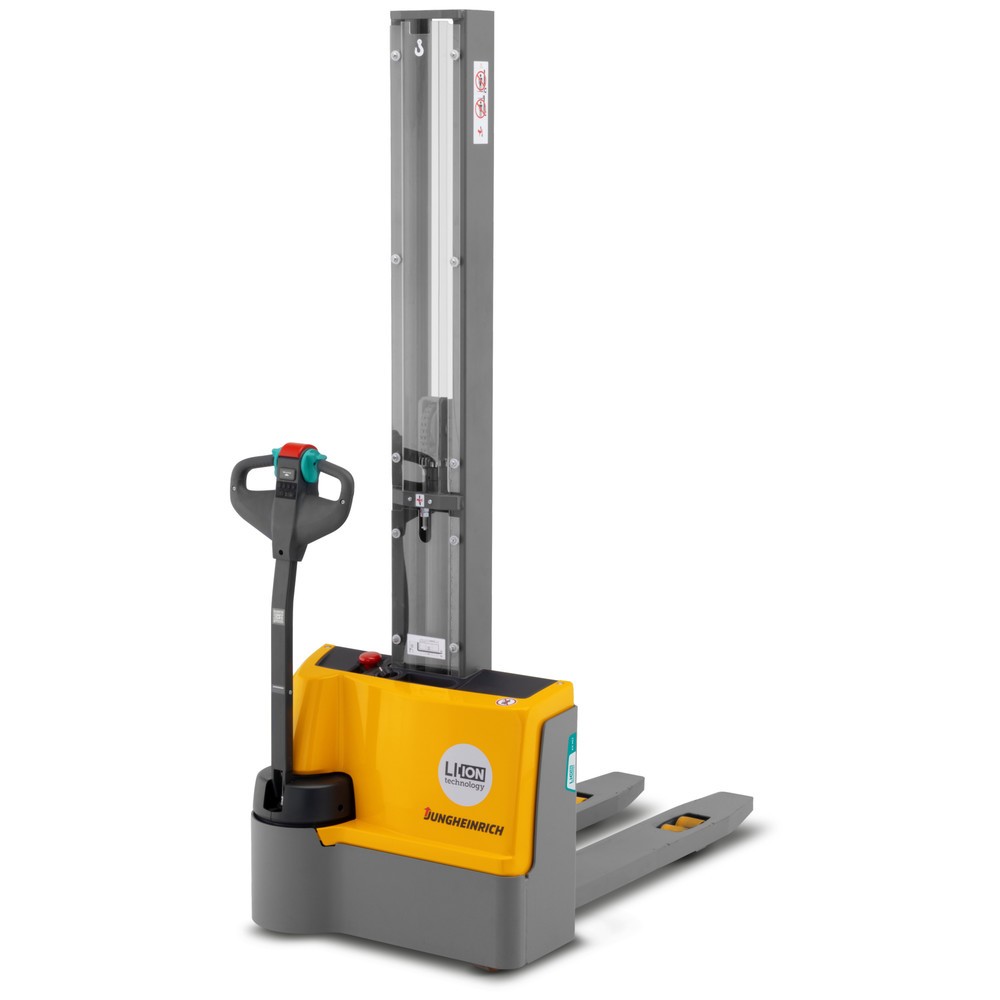
|
|
|
|
Duplex 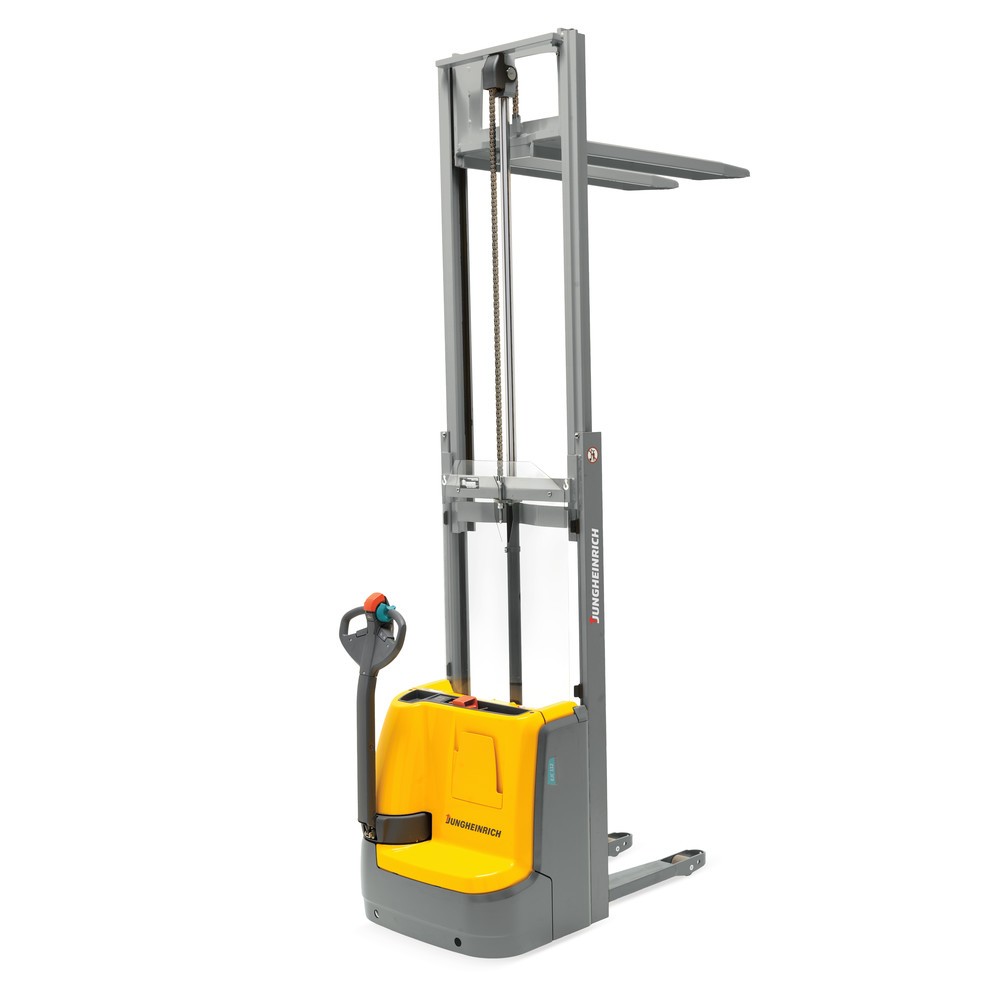
|
|
|
|
Triplex 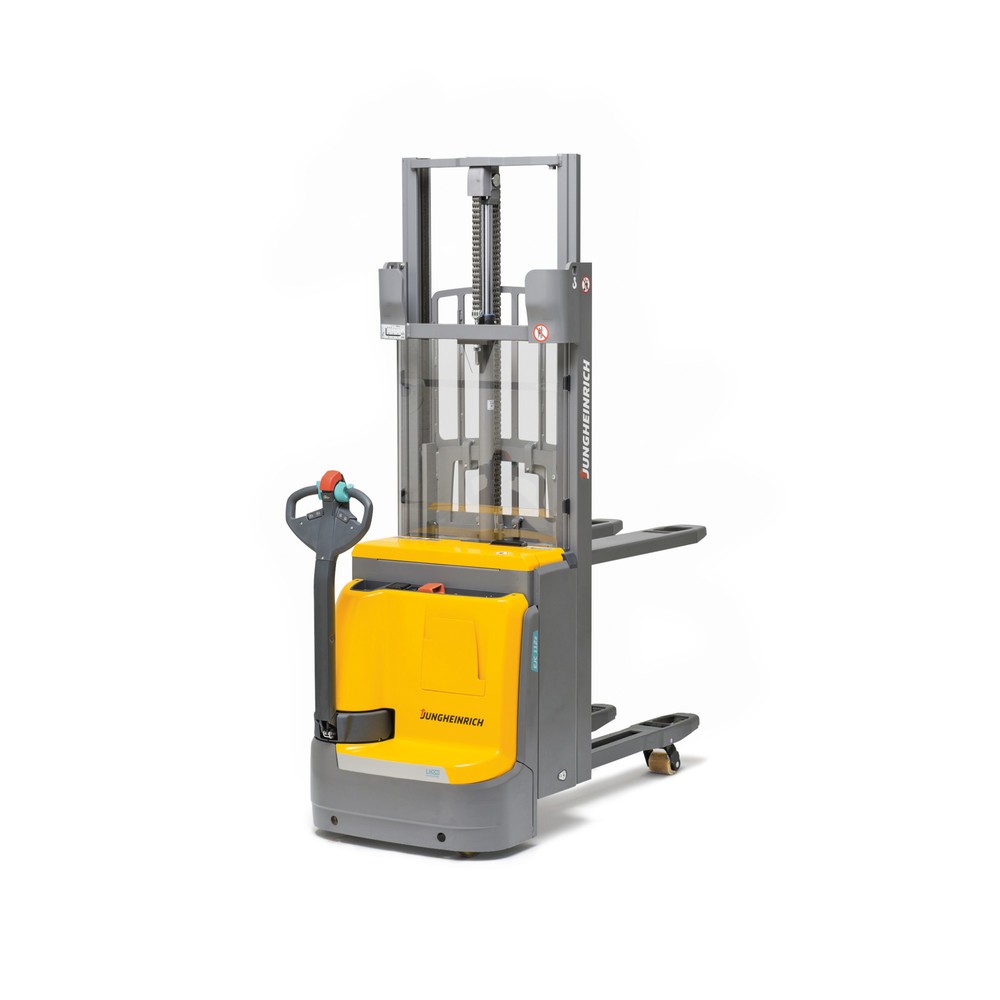
|
|
|
|
To ensure sufficient stability, you should also always pay attention to the ground: Uneven or damaged floors can affect the balance when stacking and unstacking palletized goods.
Load capacity
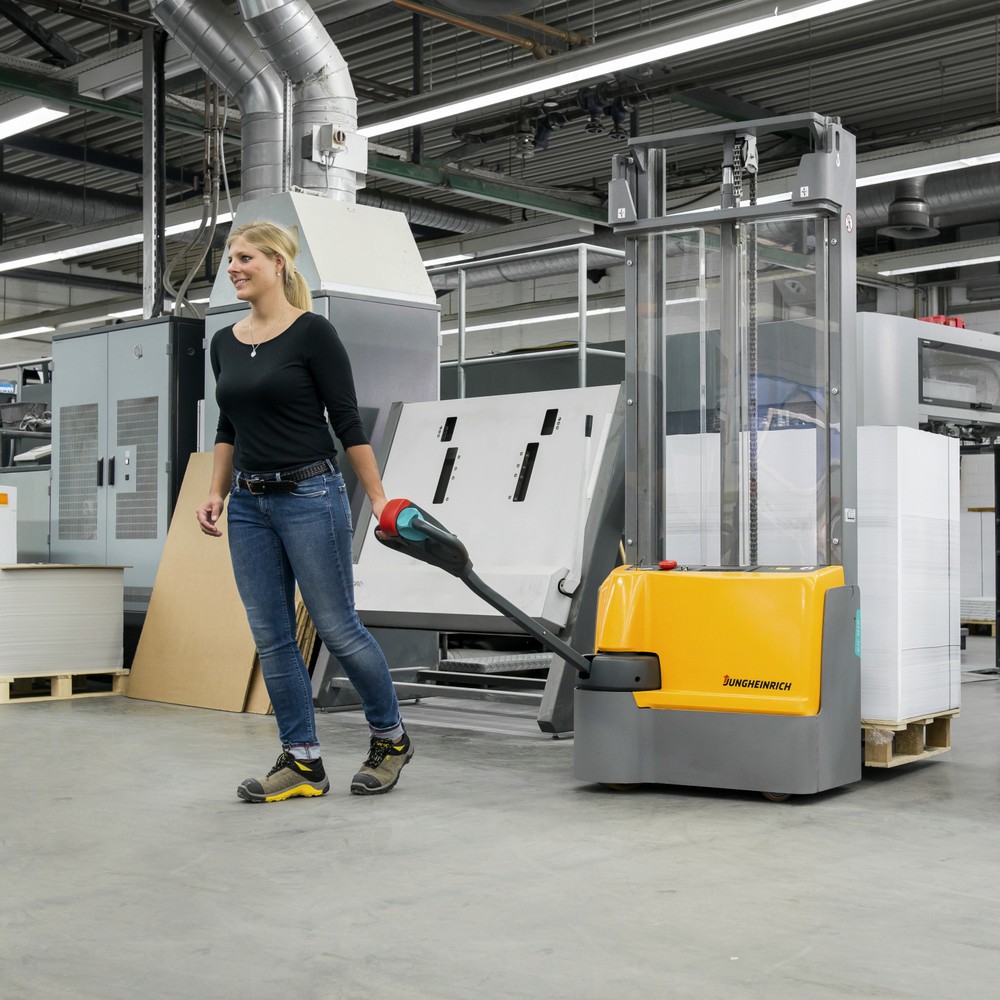
The weight-specific limit with which an electric forklift can be loaded is referred to as the load capacity or rated capacity. This must not be exceeded so that you do not overload the load-bearing elements and parts of the industrial truck, and in order not to jeopardize safe handling of the electric power stacker.
The load capacity diagram, which can be viewed on every electric high-lift truck, shows how the rated load capacity depends in each case on the lifting height and center of gravity of the load.
Fork lengths and fork equipment
For electric pallet trucks, the standard fork length is 1150 mm. This makes it easy to pick up Euro pallets and mesh pallets without manoeuvring. The fork width varies between 540 and 570 mm, depending on the model. The following applies: the heavier the electric power stacker the greater its load-bearing capacity (taking into account the fork dimension and quality of the steel used).
Additionally, our electric pallet stackers in wide dimensions are suitable for picking up special pallets. On request, we also offer special design variants, e.g. for electric high-lift trucks with special fork lengths.
In some areas of application, suitable fork equipment also plays an important role: The magnetic anti-slip pads protect sensitive surfaces, reduce vibrations and transport noise, reduce damage to goods and minimize the risk of slipping.
Transport goods and load carriers
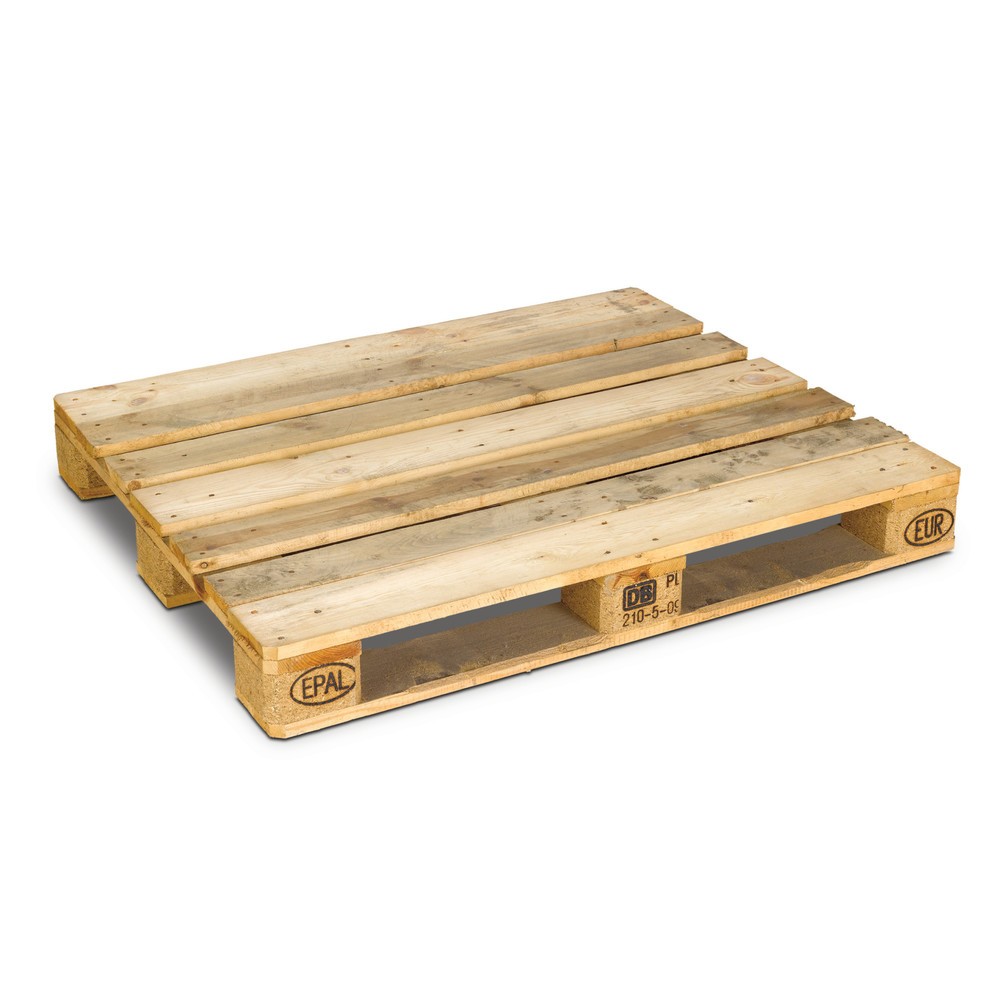
Electric stacker trucks are designed for transporting loaded Euro pallets. However, depending on the fork dimensions and load capacity, you can also use the industrial trucks to move loading aids such as storage boxes, ISO containers and wire mesh boxes or even long goods and pallets in special sizes.
For picking up, transporting, and stacking and unstacking particularly sensitive goods such as glassware or sensitive electronic components, you can also buy our electric pallet trucks that have proportional hydraulics. This function enables precise lift pulse control so that even sensitive loads can be carefully lifted, lowered, and deposited on the shelf or on the floor.
Battery size and type
Our high lift power stackers are equipped with one of the following three rechargeable battery types as standard:
- Lead-gel rechargeable batteries or lead-acid battery. The capacity of these powerful traction batteries enables reliable work in the warehouse. The display instrument on the chassis allows you to keep an eye on the battery charge level and the number of operating hours at all times. If the charge of the lead-acid battery is exhausted, you can conveniently charge the truck with the integrated charger at a 230-volt socket.
- Lithium-ion battery: When you need more performance, we recommend the low-consumption lithium-ion electric stacker trucks from Jungheinrich. The batteries have a long service life, offer high energy efficiency while maintaining a compact design, and can be easily charged between uses. The integrated charger recharges the lithium-ion battery regardless of location and in the shortest time possible.
The direct performance comparison of the three battery types simplifies the selection of the suitable variant:
| Features | Lithium-Ion Battery | Lead-Acid Battery | Lead-Gel Battery |
|---|---|---|---|
| Life expectancy | ~ 3000 charge cycles | ~ 1200 charge cycles | ~ 900 charge cycles |
| Charging time | 1.5–3 hours | Minimum 6.5 hours | Minimum 6.5 hours |
| Maintenance | None | Refill of demineralized water 1x per week | None |
| Intermediate charging | Possible at any time | Limited possibility | Not possible |
| Battery change during multi-shift operation | Avoidable with intermediate charging | Required | Not recommended |
| Advantages |
|
|
|
| Disadvantages |
|
|
|
| Application |
|
|
|
This video compares lithium-ion batteries with lead-acid batteries and shows you the advantages of both battery types:
Tires
All Jungheinrich and Ameise® electric pallet stackers have a 4-point chassis consisting of a drive wheel, a support wheel and two or four fork rollers to achieve optimum stability and driving safety when stacking and retrieving loads.
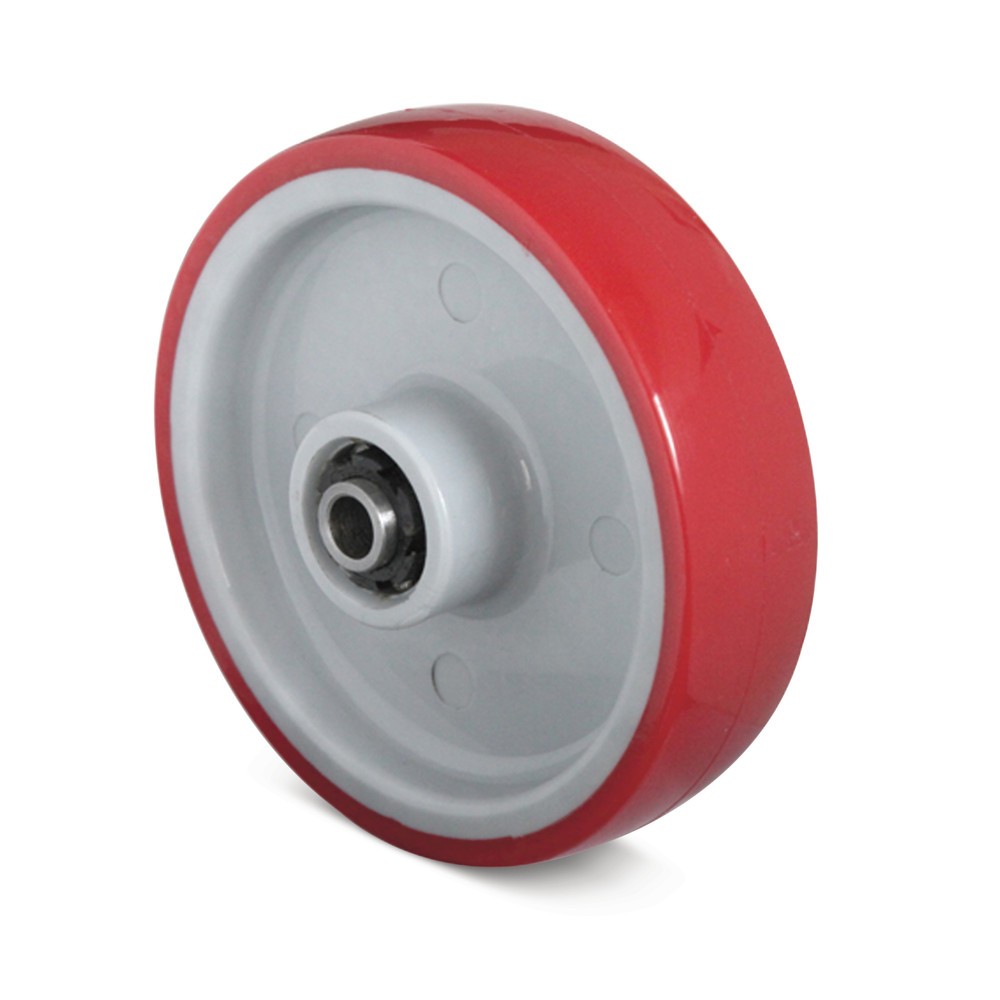
In contrast to counterbalanced trucks, the tires are much smaller in circumference, as the site where these trucks are used usually offers good driving surfaces. In addition to the floor condition as the most important selection criterion for wheels and castors for high lift trucks, other parameters must also be taken into account:
- Noise emission
- Starting and rolling resistance
- Load capacity
- Good impact load (when driving through bumps, potholes or thresholds)
- Hygiene requirements
- Environmental influences such as wetness or chemicals
- Climatic conditions
- Electrical conductivity requirements
When you buy an electric pallet stacker, the tires of the industrial truck should be designed as appropriately as possible for the area in which it will be used. In addition, depending on the area of application and the ground being driven on, you can choose between electric stackers with single fork rollers or tandem fork rollers:
- Single-fork rollers are preferably used on level floors and allow easier manoeuvring than tandem rollers. Wear on the rollers is higher than on tandem fork rollers.
- Tandem-fork rollers are particularly suitable for uneven floors and for overcoming speed bumps. The weight of the load is distributed over 4 rollers, which reduces the contact pressure and thus the wear per roller. Overall, the high-lift truck thus also runs more smoothly and stably on uneven surfaces.
The material properties of the rollers sometimes differ fundamentally:
| Parameter | Polyurethane (PU) | Thermoplastic polyurethane (TPU) | Nylon | Solid rubber |
|---|---|---|---|---|
| Smooth surfaces | × | × | × | × |
| Moist oily surfaces | × | × | × | × |
| Fragile | × | × | × | × |
| Resistent | × | × | × | × |
| Chemically resistant | × | × | × | × |
| Uneven surfaces | × | × | × | × |
| Low-noise | × | × | × | × |
| Abrasion resistant | × | × | × | × |
| Heavy duty | × | × | × | × |
| Wear resistant | For drive wheels, support wheels and load rollers | Only as drive wheel | For drive wheels, support wheels and load rollers | Only as drive wheel |
In addition, two variants of the PU wheels are available on request:
- For environments where electrical conductivity must be considered, we carry antistatic PU drive wheels that dissipate an electrostatic charge into the ground, preventing punctures.
- For particularly smooth or slippery surfaces, you can also choose PU wheels sanded with quartz sand: The special drive wheels enable improved ground contact (traction) due to the coating.
Pedestrian operation
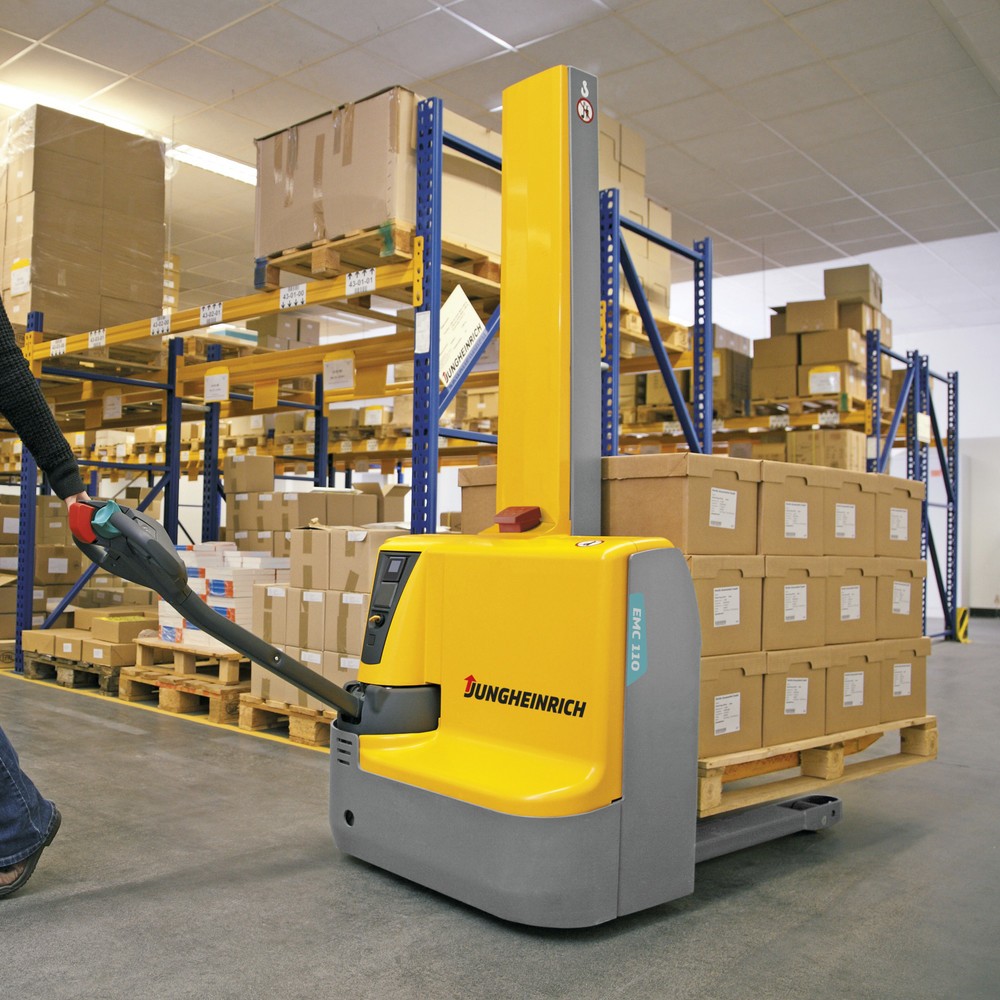
We offer pedestrian power stackers for both left- and right-handers:
Pedestrian operation: Here, all steering and operating functions are performed by an operator accompanying the vehicle. The industrial trucks used exclusively in pedestrian operation are preferably equipped with a long, low-mounted tiller. This ensures a sufficient safety distance between the vehicle frame and the operator. By swivelling the tiller, the drive wheel is moved in the desired direction of travel. You can conveniently regulate the drive using the controls mounted on both sides of the tiller head. Electric pedestrian pallet trucks are particularly suitable for short and medium transport distances.
Individual equipment options
In addition to our wide range of electric power stacker trucks with various functions and equipment options, we also offer you the possibility of adding further individual functions to your electric truck. These include, for example, display indicators, organizer functions or special drive wheels.
Furthermore, it is possible to have different masts, different battery types and sizes as well as chargers installed individually. Depending on the model, individual access systems, refrigeration or deep-freeze equipment, ramp comfort, proportional hydraulics for particularly sensitive loads or aquamatics for simplified maintenance of lead-acid batteries are also possible.
In addition, we also offer electric high-lift trucks with special fork lengths and widths, weighing equipment or in stainless steel design within the scope of special construction. Our competent technical advisors will be pleased to help you with your selection.
3. Which powered pallet stacker variants are available?
In our online store you will find the right electric stacker for every application and need.
Electric pallet stackers with ramp comfort or initial lift
If you frequently have to drive over uneven floors in your warehouses, overcome floor thresholds such as drive-over plates, or manage ramp crossings and loading bridges, electric high-lift trucks with additional lift are ideal: At Jungheinrich PROFISHOP, electric stacker forklifts with ramp comfort or wheel arm lift are available for this purpose.
By raising the wheel arms, both functions ensure that the electric material handling truck gains more ground clearance and that safe and stable travel is guaranteed even when driving over uneven surfaces or thresholds. Depending on the type of auxiliary lift, inclines of up to 16% can be mastered. By way of comparison: Without auxiliary lift, only inclines of 5% can be overcome.
| Parameter | Meaning |
|---|---|
| Wheel arm lift (initial lift) |
The additional lift, which is operated independently of the mast lift, raises the wheel arms evenly parallel above the ground and thus achieves level compensation. The electric pallet truck can thus compensate for inclines of up to 16%. |
| Ramp comfort |
The function activated on the vehicle tiller uses two robust cylinders to ensure that the load rollers press down. This tilts the electric pallet truck by 3° and provides more ground clearance in the front area of the wheel arms. This makes it possible to overcome incline kinks of up to 14% comfortably and safely. The slight backward tilt of the electric pallet truck additionally ensures that the load is brought into a safe center of gravity position in the process. |
Electric wide-gauge high lift truck
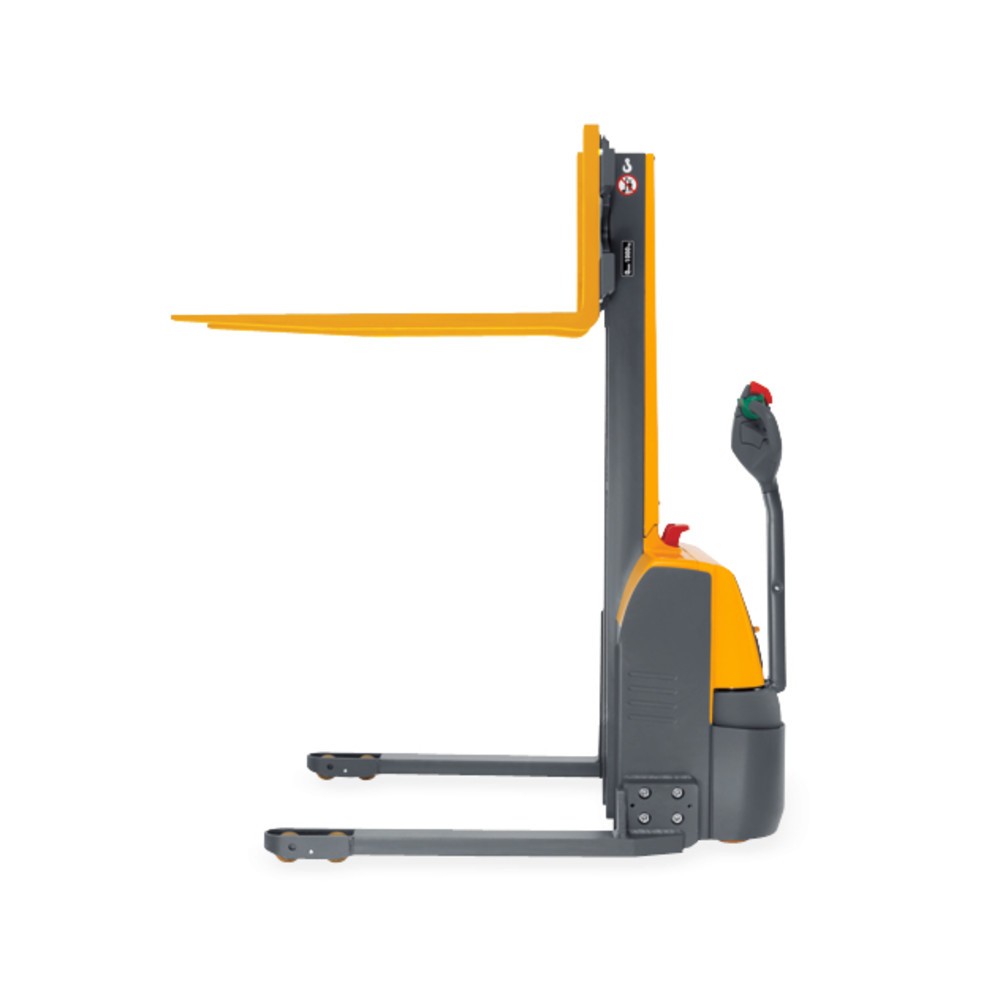
In addition to Euro pallets, our all-electric wide-gauge high-lift trucks also pick up closed load carriers without any problems. The transverse pick-up of pallets is also possible with these industrial trucks. For this purpose, the wheel arms drive around the load unit, whereby the fork arranged between the wheel arms can be lowered to the ground: Pallets can be picked up in this way in the same way as with a cantilever electric forklift. The vehicles are supplied with a specific wheel arm spacing, which in each case limits the maximum length or width of the load unit. Other wide-gauge variants are also optionally available for loads of different sizes. On models with ISO fork carriage (e.g. the EMC B10), the fork carriage is also adjustable so that pallets of special sizes can also be transported.
Our wide-track forklifts are supplied with a standard design that allows for gripping pallets up to approx. 900 mm wide. Optionally, the distance between the wheel arms can be extended by further modifications, but up to a maximum of 1270 mm.
The advantages of wide-gauge electric high-lift trucks:
- Pick-up of closed goods and special pallets
- Transverse pick-up of (Euro) pallets
- Forks can be lowered to the floor
- Different wheel arm distances optionally available
- Models with adjustable ISO fork carriage also enable the mounting of a wide variety of attachments, such as crane hooks and drum turners, and make the broad-gauge truck's range of applications particularly flexible and versatile.
4. FAQ for electric pallet stacker
Electric high lift pallet trucks are mostly used for regular or occasional horizontal and vertical pallet handling, especially in indoor warehouse areas. They can be used to stack and retrieve goods at medium to high rack levels. In addition, the electric stackers are ideally suited for transporting goods over medium to long distances, whereby the long-distance variants are designed with a driver's stand or seat for riding along.
- The use of electric high lift trucks in warehouses, shipping or sales areas is advantageous for many reasons.
- Electric forklifts are available in a range of models from entry-level to high-performance. This means that the requirements profile and investment costs can be brought into a worthwhile relationship for any budget - even for small companies.
- Many models do not require an industrial truck license.
- Electric drive increases productivity and efficiency.
- Your employees will enjoy electric motor-assisted and thus ergonomic work.
- The high level of user-friendliness enables simple and intuitive operation.
- E-stackers are versatile and are used for transport, storage and retrieval, and order picking.
- A suitable vehicle is available for every application scenario, which can be further tailored to your personal needs with individual options if required.
Not necessarily: In the case of a pure pedestrian electric high-lift truck, you do not need a driver's license, but only company-specific instruction on all relevant safety regulations, such as potential accident risks, the function of the truck as well as its attachments and stability, before operating the truck for the first time.
Electric pallet stacker forklifts should only be used outdoors if the vehicles are designed for this purpose. However, the outdoor areas must be free of precipitation. For this reason, electric forklifts must not be used in cold stores or freezers, or for interchangeable applications with condensation, as they can be damaged by moisture. Electric high-lift trucks are also not suitable for environments with a high dust content or for use on oily and very wet surfaces: robust forklifts with combustion engines are the better choice here.

